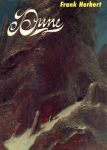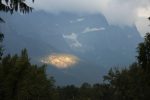The cherry blossoms are blooming in Vancouver today, and today’s run was warm and sunny, promising of spring. My running thoughts were all about Alejandro Jodorowsky (whose birthday is today!) whose vision of the film Dune, based off Frank Herbert’s novel, should go down into history as the greatest film never made. I would highly recommend the documentary Jodorowsky‘s Dune, which my husband and I watched on Valentine’s Day. Afterward, I was so hopped up I started re-reading the novel. When younger, I was mesmerized by the Jodorowsky’s movies El Topo and Fando y Lis as well as the classic sci-fi Dune. But I have to say that this documentary made me sad because Jodorowsky’s Dune was never made and should have been. I’d like to think it still could be.
The novel itself is one thing. Frank Herbert used fiction to relay some complex relationships among humans, ecology, ideology, and technology. Edward James and Farah Mendlesohn in The Cambridge Companion to Science Fiction called Dune the “first planetary ecology novel on a grand scale”. The novel is the best-selling science fiction of our times.
The film adaption is another thing. Who else could take this on back then? Of course David Lynch finally got the rights, but that wasn’t until after Hollywood rejected Jodorowsky‘s violent and beautiful plan, which included a mind-blowing ensemble of artists and musicians. In many ways the concept art and planning of his version of the film is surreal and out there, but in other ways Jodorowsky‘s vision became prototypical, or at least myth-originating, for later science fiction optical art–because his cast went on to work on other films, such as Star Wars, Alien, Guardians of the Galaxy, and more. I mean, he had gotten together people/groups like Salvador Dali, Mick Jagger, Giger, Pink Floyd, and Magma. You can see their concept art and music for Dune, and then see later resurrections of it in other movies that these artists went on to do, after the rejection of Jodorowsky‘s Dune. Take Baron Vladimir Harkonnen, for instance. One of Jean “Moebius” Giraud’s concepts for this character looks amazingly like World of Warcraft’s “Princess” boss in Maraudon–not to mention Orson Welles might have played the Baron. That would have been too good. Perhaps we would have been spoiled by such a grandiose adventure.
Alejandro Jodorowsky admitted to having not read Dune before taking on the film adaption, though he must have read parts of it to get ideas for the characters, spaceships, the big desert planet Arrakis, and so on. His idea for the beginning of the movie was as epic as his ideas for the film itself: an extreme long shot (can’t remember whether that was his term) of the entire universe, where the camera is slowly zooming in past planets, suns, stars, and so on until it meets the scene of the pirates smuggling melange.
Jodorowsky uses artistic creativity with his adaption (spoilers!): After the dry, corrupt Arrakis is saved by more benevolent rulers, the Arrakeen is overcome with goodness, life, and green vegetation. Its blue and green orb flies through the universe to the rest of the House-occupied planets, much like Jodorowksy’s version of the conception of Paul Atreides (another virgin birth, this one with a drop of the male’s blood flying out and seeking its womb, like the redeemed planet seeking places to seed) to join the rest of the universe, giving life and light to the other planets. It’s a solid cosmological myth that pervades so many narratives: death, decay, darkness, and corruption may only be consumed, redeemed, and replenished with life-giving forces, which are generally good. We have seen stories built about this essential theme from the beginnings of human history, and it is important to glean from these stories that nature is a symbol of life, and the destruction of nature–which can manifest in bad technology, greed, and power–equals the lack of life, or death. Malange is our oil.
Jodorowsky says in the documentary that artistic endeavors should not be part of an industry. Art is art. Industry is industry. Despite this man’s abundant radiance and humor, Jodorowsky was disappointed that the film was rejected, that Hollywood didn’t trust his vision and eschewed his dreams because perhaps they have stereotyped him as too far out there. But Hollywood isn’t about the art. It is about the money. And if there is money to be made in telling a good story, then so be it, amen. But I think Hollywood really missed the boat on this one.







